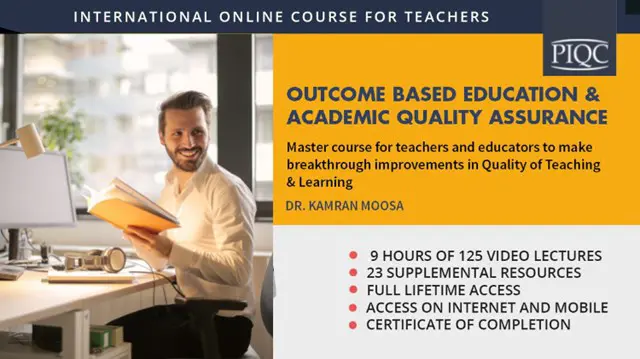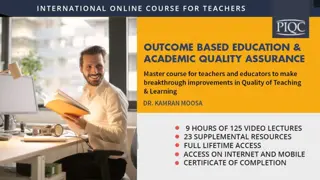
Outcome Based Education (OBE) & Academic Quality Assurance
Master Course for Teachers' Leadership Development covering real life applications of Learning Taxonomies
Kamran Moosa
Summary
- Reed Courses Certificate of Completion - Free
Add to basket or enquire
Overview
What you'll learn
-
By completing this transformative course, you'll gain a wealth of knowledge and skills that will help you elevate your teaching to new heights
-
Articulate the key differences between traditional, teacher-centred education and modern, and student-centred education,
-
Master the principles of quality assurance in education, including teachers-students communication, curriculum design, assessments, and more
-
Understand different learning theories and taxonomies, e.g. Bloom's, SOLO and many more
-
Explore ISO 9001 quality management systems for education and how they can be applied in your educational institution to improve teaching and learning systems
-
Implementation guidelines to better Quality Assurance in Education
-
Explore the opportunity to transform your teaching and create engaging, effective learning experiences for your students.
Curriculum
-
Section 1: Fundamentals of Outcome Based Education (OBE) 41:29
-
Bloom's Taxonomy: The 3 Domains 1:09:38
-
SOLO Taxonomy 02:41
-
Kirkpatrick Training Evaluation Model 06:49
-
Multiple Intelligences (Howard Gardner) 11:43
-
Constructive Alignment 18:34
-
Student Learning Outcomes (SLOs) 32:17
-
Fundamentals of Quality Assurance in Education 39:34
-
Quality Assurance in Teaching 16:30
-
Quality Assurance in Curriculum 16:38
-
Quality Assurance in Exams & Assessments 42:25
-
QA in Student-Teacher Communication 22:19
-
Quality Assurance in Research 29:04
-
Quality Assurance in Students Affairs & Services 28:07
-
Accreditation 20:41
-
OBE & QA Implementation 15:22
-
Quality Assurance in Online Education 44:23
-
Educational Leadership 21:37
-
Meeting Challenges of Educational Quality 29:39
-
Course Summary and Conclusion 11:01
Course media
Description
Join our comprehensive Master Course for Teachers' Development, designed to take your teaching skills to the next level!
This course covers the latest real-life applications of Learning Taxonomies such as Bloom's and SOLO, and provides practical guidance on improving the quality of teaching, curriculum development, and assessments.
With over four thousand highly satisfied teachers and academics enrolled from around 80 countries, this is the only course on this topic available on Udemy. You'll learn modern concepts, tools, and methodologies to achieve world-class education and high-quality learning outcomes for your students.
We'll cover everything from fundamentals to advanced-level theories, with plenty of practical examples and best practices. Our aim is to transform an ordinary teacher into an outstanding one. With a focus on Outcome-Based Education, we'll help you shift towards a student-centered classroom, and teach you new methods and approaches to meet the required learning outcomes.
Academic Quality Assurance is also a key component of this course, providing you with the tools to set academic standards and continuously improve learning outcomes. We'll cover QA initiatives in areas such as teacher and teaching, curriculum, assessment, research, and student affairs and services, as well as the use of eLearning and its latest trends. We'll introduce you to popular QA/accreditation frameworks, programs, and models used in schools, colleges, and universities worldwide.
Join our experienced instructor Dr. Kamran Moosa, who heads the PIQC Institute of Quality and is presently the Chair of Quality in Education Think Tank of International Academy for Quality, a center for excellence in quality, and gain valuable insights into global experiences and challenges faced by teachers, institutions, and state levels. Don't miss this opportunity to become a world-class educator – enroll now!
Who is this course for?
- Teachers and instructors of schools, colleges and universities
- Management and Administrators of Educational Institutions
Requirements
-
No specific pre-requisites
Questions and answers
Currently there are no Q&As for this course. Be the first to ask a question.
Certificates
Reed Courses Certificate of Completion
Digital certificate - Included
Will be downloadable when all lectures have been completed.
Reviews
Currently there are no reviews for this course. Be the first to leave a review.
Legal information
This course is advertised on reed.co.uk by the Course Provider, whose terms and conditions apply. Purchases are made directly from the Course Provider, and as such, content and materials are supplied by the Course Provider directly. Reed is acting as agent and not reseller in relation to this course. Reed's only responsibility is to facilitate your payment for the course. It is your responsibility to review and agree to the Course Provider's terms and conditions and satisfy yourself as to the suitability of the course you intend to purchase. Reed will not have any responsibility for the content of the course and/or associated materials.


